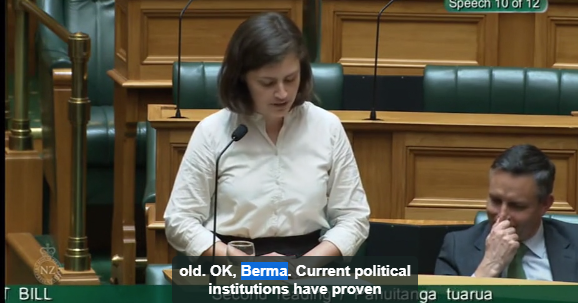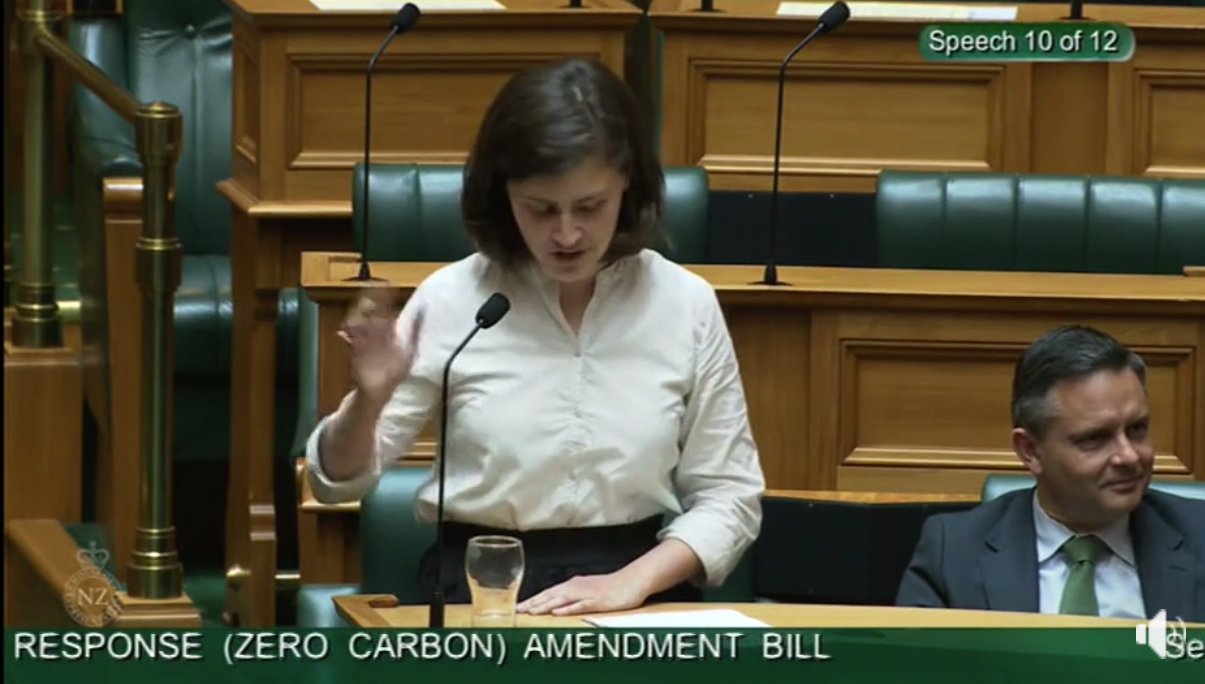New Zealand's youngest parliamentarian since 1975, Chlöe Swarbrick, spoke in parliament on Tuesday in favour of an ambitious law that sets the country’s target carbon emissions at zero by 2050.
The 25-year-old Greens MP was talking about her frustration with the political inaction by older generations – particularly the ones who are in parliament – when she was heckled by one of the men she was putting on blast.
Her response? "OK boomer."
The video of Swarbrick shutting down her heckling colleague quickly went viral. She spoke to BuzzFeed News about the meme, why her use of it resonated so much, and the response she got from baby boomers.
Your "OK boomer" response has gone viral. When did you first realise it was getting attention?
It was probably when my old man texted me letting me know about it. He’s got Google Alerts on for me, where he semi-regularly starts a one man protest about what he perceived as unfair reporting about me. It was quite funny and interesting and bewildering that two words were far more interesting to the rest of the world than the legislation we passed.

Take us through the moment. Why did you say it?
I have a little brother who first told me about it. He’s 13 years old and on TikTok. Before I said it, I had become familiar with the term about a week prior, popping up in social media, and I’d read a few articles about it. It was interesting, a seeming zeitgeist moment.
I don’t often reference my age in parliament. Usually others do it for me. But thinking about how frequently the debate about climate is viewed through a short-term political lens, it made sense to point out how ridiculous it was to have a parliament with an average age of, well, they aren’t spring chickens, some of whom are trying to water down climate action and weaken it.
So it came up, when, in the middle of my speech on intergenerational inequality, some members started chucking around some argy-bargy. I felt like throwing back, so that’s when I said it.
There was a moment of stunned silence as they figured out what it meant. So, that allowed me to finish my speech in peace.
You told the heckler "OK boomer" after you were interrupted talking about how the baby boomer political leaders had not taken action on climate change. How did it feel to respond like that?
I do regularly respond when I’m interrupted. It’s not the first time that I’ve addressed people heckling me. But it is the first time that it’s been picked up outside of the chamber. And I think that’s because of firstly, I guess, the big-time meme and secondly, hopefully, the huge impact of climate change that’s being borne by younger generations.

Had you thought about saying it before?
It was literally a spur of the moment thing. I had been made aware of it as a result of a conversation with my little brother, so I guess it was in my consciousness.
Have you had to explain ''OK boomer'' to your colleagues?
None of them picked up on it at the time, but of course the internet did. There were a few tweets about it in NZ political circles, having a laugh. Then the political youth started weighing in and it really spiralled out of control.
How did other parliamentarians react? Did any of them complain or congratulate you?
Most just took in good humour. Heckling and responding is just part of the cut and thrust of the day. People will just have a crack at you and you sometimes do need to respond. Some folks from the opposition were trying to shut me down while I’m talking about climate inaction, so I called it out. But if you look at my emails as it started being picked up by American media, it’s interesting what I got.
Let’s talk about those responses. You posted a video of the moment to your social media accounts and I went through the comments and it seems like there are heaps of people cheering on what you said. But, have you heard from baby boomers?
I have heard from a number of older people, from those who found it not [to] their taste, to others who cheered it on. I’ve tried to respond to all of them and explain the meme. The reality is that it’s [an] expression of so much frustration from generations. I’m talking about Gen X, millennials and Gen Zers who are just frustrated about the lack of urgent action on climate change and growing inequality. They’re sick of being dismissed, ironically for not having enough life experience.

Is there anyone else you’d like to say "OK boomer" to?
Oh, I’m not sure. I think I might be responsible for killing the meme. I’m not planning on dropping another meme any time soon — I suppose one way to ensure the swift death of a meme is to include it in a politician’s regular vernacular.
Why do you think "OK boomer" has been getting such a reaction?
It is a relatively innocuous pair of words. I think that for some, it signals the absolute sense of exhaustion with having to articulate time and time again that things never seem to change on a systemic level, and then being met with dismissal.
At the start of the interview, you said you found it funny that the two words got more attention than the significant piece of climate change legislation that the New Zealand parliament passed this week. Why is that?
We passed that significant piece of law to get our country to carbon neutrality by 2050 almost unanimously, which I think is huge and monumental for a tiny country at the bottom of the Pacific. The importance of doing that ... is to show other countries and their citizens what is possible if they demand their governments do the same.
I think that hopefully, even though it’s riled a few people up, it serves to start more of a conversation about generational equity and the need to have a longer view or vision or perspective about the impact of a policy.
If I may, I’d also like to say to young people who are frustrated with their political leaders, that the devastating irony when you see older, supposedly wiser people or politicians shutting me or you down, when politicians are refusing to meaningfully engage with the public or behaving badly, everyday people switch off, and the poorly behaved decision makers get away scot free. They have an excuse to maintain the status quo, because they’ve got rid of those putting their feet to the fire in demanding progressive change. The only way to actually achieve the political action we desperately need is for those younger generations [to] get active.
